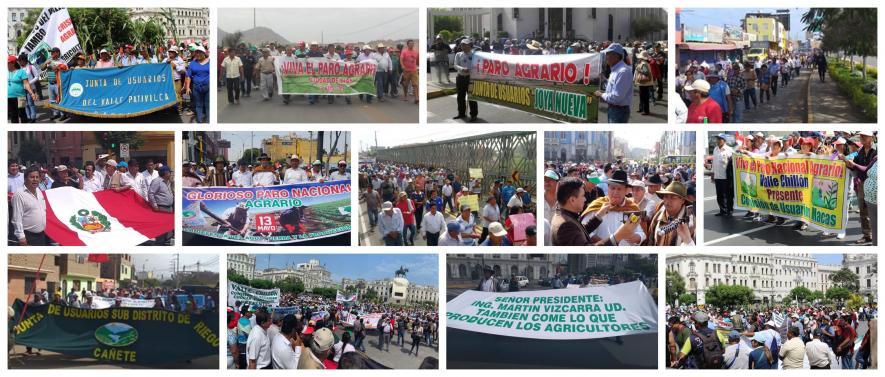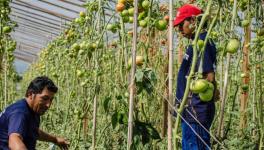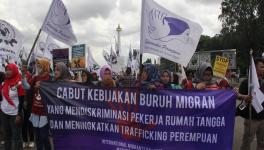Peruvians Carry Out Massive National Agrarian Strike

On May 13, nearly half a million agricultural producers from 17 regions of Peru took part in the national agrarian strike and mobilized across the country in defense of water, land and national production. The strike was called for by the National Convention for Peruvian Agriculture (Conveagro) and the National Users’ Board of the Irrigation Districts of Peru (JNUDRP), along with more than 10 other agricultural organizations and unions.
Beginning early in the morning, the producers began mobilizing and blocked roads in various regions of the country. In Lima, over 2,000 gathered at the Plaza Dos de Mayo and marched through the center of the city, under strict police surveillance. They mobilized through the avenues and streets of Garcilaso de la Vega, Paseo Colón and Abancay, and concluded the march at the San Martín Plaza.
“The needs of the rural peasant sector of Peru cannot be denied. They cannot deny that there is 47% of extreme poverty in our sector. Today, on May 13, the rights that were stolen from the poor population of Peru by corruption, have to be returned,” said Clímaco Cárdenas, president of the Conveagro.
Several incidences of police repression were registered in the regions where highways and roads were blocked. As a result of the clashes between the national police and the demonstrators, dozens of people were injured and many were arrested.
In the region of La Libertad, sugarcane and corn producers blocked one of the main bridges in the province of Virú, which connects the Pan-American Highway to the south of the country. The officials of the National Police of Peru violently repressed the demonstrators in an effort to unblock the highway. Five protesters were arrested and the highway was reopened after 30 minutes.
In the same region, roads were also blocked in the district of Chicama and in the provinces of Ascope and Pacasmayo. In Chicama, the police attacked protesters with pellets and threw tear gas bombs at them in an attempt to reopen the road blocked by them. The situation was similar in the provinces of Ascope and Pacasmayo. In the province of Ascope, at least two people were injured in a confrontation with the national police.
Similarly, in the department of Piura, agricultural producers blocked the roads that connect the city of Piura with Catacaos, Tambo Grande, Paita, Sullana, Talara, Chiclayo, Trujillo, Chulucanas and Talara. They used tires, huge rocks and wooden logs to block the roads.
The protesters also blocked roads in the regions of San Martin, Arequipa, Áncash, Puno, Lambayeque and Amazonas. Incidences of police repression on the protesters who blocked roads were reported in these regions also. In the city of Chiclayo, in the Lambayeque region, at least 4 protesters were injured.
The Conveagro indicated that the strike will continue for an indefinite period of time in the regions of San Martín, Cajamarca and Amazonas.
The farmers received the support of several social movements and organizations as well as of the General Confederation of Peruvian Workers (CGTP). The mobilizations also received the support of Congressman Yohny Lescano of the Popular Action party. Congressmen Humberto Morales and Horacio Zeballos also expressed their support to the demands of agricultural sector by joining them in the march in Lima.
They were demanding an agrarian policy that defends the interest of small and medium farmers against subsidized imports and unfair competition. They demanded modification of the tariff policy on food imports and creation of measures that promote national agricultural production.
“Since 2007, [the government] withdrew tariffs (taxes) on imported food products, today we are demanding the restoration of these tariffs to protect the local agricultural sector,” said Cárdenas.
Their demands also include the implementation of the Law of Family Agriculture, the withdrawal of the modifications to a water privatization law (law no. 30157), the cessation of administrative harassment of the JNUDRP by the National Water Authority (ANA), the direct purchase of products from small scale farmers by the State through social assistance programs and public institutions, and the access to fertilizers at affordable prices to farmers.
The protesting producers were demanding a multi-sectoral meeting with different government authorities to discuss the demands that address the issues faced by more than 3 million small and medium scale agricultural producers. Cárdenas warned that the sector would go an indefinite strike after 60 days if that government fails to hold the said meeting.
Get the latest reports & analysis with people's perspective on Protests, movements & deep analytical videos, discussions of the current affairs in your Telegram app. Subscribe to NewsClick's Telegram channel & get Real-Time updates on stories, as they get published on our website.

















